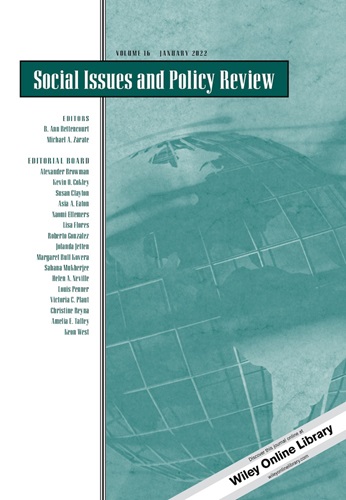了解在面向儿童的机构中与儿童谈论种族和种族主义的挑战与机遇
IF 5.6
1区 心理学
Q1 PSYCHOLOGY, SOCIAL
引用次数: 0
摘要
各学科的研究人员都强调,有效地使儿童了解种族和种族主义对促进积极的结果,如阻 止种族主义态度和信念的形成至关重要。虽然父母和监护人会影响儿童的种族态度和信仰,但儿童也会从生活中其他许多重要的成年人,如教师、社区领袖和图书管理员那里了解种族和种族主义。然而,在面向儿童的计划、政策和程序中,与种族相关的主题大多缺失或发展不足。在本文中,我们描述了在面向儿童的机构(如图书馆、博物馆和学校)中有效地使 儿童种族和种族主义社会化的三大障碍:(1) 成人对儿童的社会和认知种族发展的看法 (往往不准确);(2) 成人对种族和种族主义的了解以及与他人讨论时的自在程度;(3) 在 机构和人际交往中尽量少明确讨论种族和种族主义的社会规范。为了说明这些障碍的来龙去脉,我们探讨了儿童如何在整个童年时期处理和推理种族问题,并概述了在家庭内外让儿童了解种族和种族主义社会化的有据可依的益处。最后,我们提出了一些建议,旨在将这一研究成果转化为以儿童为中心的空间,并提供了在自己的影响范围内实施此类做法时应考虑的一般准则。总之,我们认为,有效的种族和种族主义社会化对所有儿童都有好处,可以(也应该!)在家庭之外成功实现;与儿童互动的成年人必须审视自己的信仰、偏见和观点,努力培养文化能力,投资并不断重新评估各种做法和政策,以促进有效的种族和种族主义社会化。本文章由计算机程序翻译,如有差异,请以英文原文为准。
Understanding the challenges and opportunities of talking to children about race and racism in child‐facing institutions
Researchers from a range of disciplines emphasize that effectively socializing children about race and racism is vital to promoting positive outcomes, such as disrupting the development of racist attitudes and beliefs. While parents and guardians influence children's racial attitudes and beliefs, children also learn about race and racism from many other important adults in their lives, such as teachers, community leaders, and librarians. Yet race‐related topics are largely absent or underdeveloped from child‐facing programming, policies, and procedures. In this paper, we describe three major barriers to effectively socializing children about race and racism within child‐facing institutions like libraries, museums, and schools: (1) adults’ (often inaccurate) beliefs about children's social and cognitive race‐related development, (2) adults’ knowledge and comfort discussing race and racism with others, and (3) social norms that minimize explicit discussion of race and racism in institutional and interpersonal contexts. To contextualize these barriers, we address how children can process and reason about race across childhood and outline the evidence‐based benefits of socializing children about race and racism inside and outside the home. Finally, we provide recommendations aimed at translating this research to child‐focused spaces and provide general guidelines to consider when implementing such practices in their own spheres of influence. In sum, we argue that effective socialization about race and racism benefits all children and can (and should!) be achieved successfully outside of the home; and that adults who interact with children must interrogate their own beliefs, biases, and perspectives, work to develop cultural competence, and invest in and continually reassess practices and policies to facilitate effective socialization about race and racism.
求助全文
通过发布文献求助,成功后即可免费获取论文全文。
去求助
来源期刊

Social Issues and Policy Review
Multiple-
CiteScore
22.20
自引率
1.10%
发文量
9
期刊介绍:
The mission of Social Issues and Policy Review (SIPR) is to provide state of the art and timely theoretical and empirical reviews of topics and programs of research that are directly relevant to understanding and addressing social issues and public policy.Papers will be accessible and relevant to a broad audience and will normally be based on a program of research. Works in SIPR will represent perspectives directly relevant to the psychological study of social issues and public policy. Contributions are expected to be review papers that present a strong scholarly foundation and consider how research and theory can inform social issues and policy or articulate the implication of social issues and public policy for theory and research.
 求助内容:
求助内容: 应助结果提醒方式:
应助结果提醒方式:


